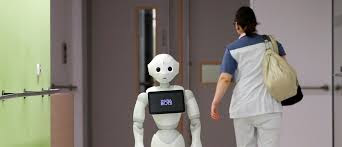But if you want to still exist in a decade, I think everybody’s going to have to be a tech company and figure out what is the thing that is going to be lasting about their company.Now, Ms. Lake isn't exactly breaking new ground with this thought -- a quick search found similar quotes from others going back to at least 2015 -- but the point remains valid. Still, though, maybe we should be thinking: in ten years, every company is going to be a health company.
I don't mean in the way that employers' healthcare obligations are forcing them to treat health as part of what they do (e.g., the auto manufacturers realizing they paid more for healthcare than for steel, or in the way Amazon/Berkshire Hathaway/JP Morgan Chase founded Haven). I don't mean in the way that tech companies are looking to see how they can move into health in order to get their piece of the $3 trillion healthcare pie. I don't even mean in the way that medical marijuana, CBD, or, God help us, Goop are trying to convince us that they can play an important role in our health.
No, I mean in the way that every company would think about, and compete on, how their products contribute to our health and well-being.
 |
| Oh, no! |
How many home furnishing, home construction, or toy companies think of their mission as helping ensure our health? If they did, we might live in different kinds of houses. One that is safer and less likely to lead to us getting hurt.
Fast Company also reported on a Chinese house based on a new model of the future of housing: "homes designed not just for able-bodied, nuclear families, but for the different needs that span multiple generations." It tries to balance privacy with ease of access and mobility for each of the generations, and consciously plans for different stages of our health.
Well, you might say, that's just China, but a related story found that more Americans are living in a household with two or more adult generations. Although still in the minority, trends like "cohousing" or "intergenerational home-sharing" may help both address the affordability of both retirement and homeownership, as well as reduce isolation. One expert told Fast Company: "There’s been so much emphasis on independence and on privacy that we really designed community right out of our lives without knowing it," with all sorts of adverse health consequences.
Take food. The food industry has focused for the last 30+ year on making food tastier and cheaper, but usually not healthier, and our obesity/diabetes rates have reflected that. It's been good for our wallet and terrible for our health, Trader Joe's and Impossible burgers notwithstanding. We're not all going to stop eating meat or only organic fruits and vegetables, but we could eat better, and the food industry could help.
 |
Suggested supermarket layout Credit: RSPH and Slimming World
|
Supermarkets will argue that they are giving their customers the choice; and we haven’t removed those choices at Nudge, all we’ve done is made it easier for customers to choose healthier alternatives and put less emphasis on promotions of foods likely to cause weight gain.Or consider, say, airplanes. They're built to deliver as many people as quickly as possible, and, while they actually have an admirable record for rarely crashing, they're not really designed for our optimal health. The air is bad and the surfaces are, well, you really don't want to know how dirty things really are. Where are the airplane manufacturers/airlines that promise not only to get you to where you are going safely but also no less healthy than how you boarded?
Many companies might argue that they don't directly make products for consumers, but that doesn't mean they don't impact our health. Think about short and long term health impacts of pollutants and carbon releases, and then think about why those impacts get borne by other entities, such as our health insurance. More direct fees and taxes on such by-products of production would bring drastic changes, or at least new funds to help address their effects.
Concern has been raised about the apparent discrepancy between tech's "move fast and break things" mindset and healthcare's "first, do no harm" directive (although the latter is hard to justify with, for example, the industry-inflicted opioid crisis or the well-known level of medical errors). The truth is that all industries, including healthcare, should be thinking more about the actual health impacts of what they do. If they did, Facebook and Twitter might not support so many toxic users, and Google would not allow such pervasive health misinformation.
Don't even get me started on gun manufacturers or the tobacco industry.
Yes, tech is sexy, tech seems futuristic, and tech is loved by investors. It's no wonder Ms. Lake and others think about being considered tech companies. But we have to remember that tech is not the goal; tech is never the goal. Tech is a tool, and what better to use tools for than to make us healthier?
Almost two years ago, Steve Downs called for us to build a Culture of Health into all we do, and that call is more needed than ever.













